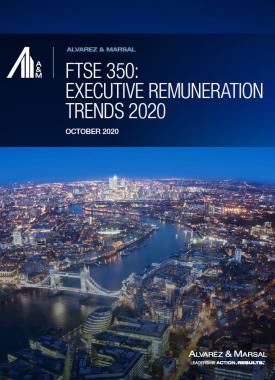FTSE 350: Executive Remuneration Trends 2020
Remuneration Committees are now considering how the impact of COVID-19 should be appropriately treated in remuneration outcomes, and also how remuneration policy and incentive structures can support business strategy when we emerge from the pandemic.
Issues vary by company and by sector, so a tailored approach is essential. The increasing acceptance amongst many shareholders of a wider variety of incentive schemes, coupled with the prevailing exceptional circumstances, may provide a unique opportunity to seek closer alignment between strategic goals and remuneration outcomes. This could also be a time to re-consider how remuneration is structured throughout the organisation.
The first annual report into FTSE 350 executive remuneration
A&M’s first annual analysis of the FTSE 350 executive pay, undertaken by our Executive Compensation experts, and based on Annual Reports published during the first half of 2020, provides a clear overview of how executive pay is moving, including:
- Remuneration policy changes
- Pension
- Post-cessation shareholding policy
- Environmental, social and governance (ESG) metrics
- CEO pay ratio
The full report also includes a quick reference guide, providing a quartile analysis of the following:
- Base salary
- Employer pension allowance
- Annual bonus
- Long-term incentive
- Target total remuneration
- Single total figure remuneration
- Shareholding requirements
Click here to download the report

How can A&M’s Executive Compensation team help?
A&M Executive Compensation Services is well-positioned to advise Remuneration Committees through this period. Engagements are led by a Managing Director who attends all meetings and is actively involved in all deliverables.
This ensures you always have access to the right level of advice, particularly when making critical decisions under time pressure. Our Managing Directors have a combined 80+ years of experience in advising on executive remuneration matters.
If you have any questions regarding the content in this report, please contact one of the authors.



